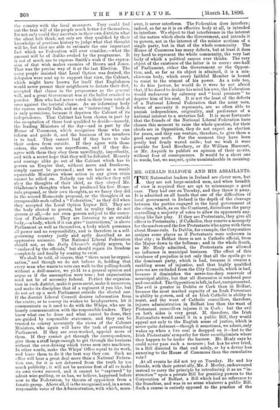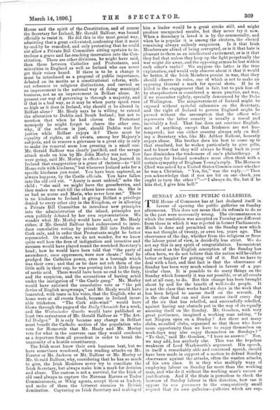MR. GERALD BALFOUR AND HIS ASSAILANTS. T HE Nationalist leaders in
Ireland are clever men, but they are not large-minded men, and when breadth of view is required they are apt to mismanage a good case. They had one on Tuesday, and they threw it away. It is admitted on all hands that one of the difficulties of local government in Ireland is the depth of the cleavage between the parties engaged in the local government of the cities, which, as on the Continent, disinclines the party controlling a majority of votes to allow its opponents any- thing like fair play. If they are Protestants, they give all offices to Protestants ; if Catholics, they reserve a monopoly for themselves and the few Protestants who agree with them about Home-rule. In Dublin, for example, the Corporation assigns some places as if Protestants were unknown in that city ; in Belfast there is not a Catholic official, from the Mayor down to the bellman ; and in the whole South, as Mr. Healy admitted, the Protestants are allowed no influence in municipal business. The effect of this virulence of prejudice is not only that all the spoils go to the dominant party, which is bad, because it creates a rankling sense of injustice, and that highly qualified persons are excluded from the City Councils, which is bad, because it diminishes the never-too-deep reservoir of municipal ability, but that all discussion is rendered poor and one-sided. The Opposition is lef t, in fact, unrepresented. The evil is greater in Dublin or Cork than in Belfast, because the most marked capacity of an Irish Protestant is ability to govern, and of an Irish Catholic is ability to resist, and the want of Catholic councillors, therefore, injures administration in Belfast less than the want of Protestant councillors injures it in Cork ; but the evil on both sides is very great. If, therefore, the Irish Nationalists would assail it in a public Bill, they would appeal not only to the English sense of justice, which is never quite dormant—though it sometimes, we admit, only wakes up when a live coal is dropped on it—but to the Irish Protestants' sympathy for their co-religionists where they happen to be under the harrow. Mr. Healy says he could never pass such a measure ; but has he ever tried, in a Bill directed to that end solely, or by a device less annoying to the House of Commons than the cumulative vote ?
At all events he did not try on Tuesday. He and his friends, with their potent ally, Mr. J, Morley, endeavoured instead to carry the principle by introducing it as an "in- struction" upon a private Bill for granting powers to the Corporation of Belfast, a Bill which had no reference to the franchise, and was in no sense whatever a public Bill. Such a course is entirely opposed to the practice of the House and the spirit of the Constitution, and of course the Secretary for Ireland, Mr. Gerald Balfour, was bound officially to resist it. He did this in the most genial way, admitting that a great evil existed, confessing that it must by-and-by be remedied, and only protesting that he could not allow a Private Bill Committee sitting upstairs to in- troduce a grave and far-reaching innovation into the Con- stitution. There are other divisions, he might have said, than those between Catholics and Protestants, and minorities in England as well as Ireland who can never et their voices heard. If there is to be a change it must be introduced as a proposal of public importance, debated on its merits as a constitutional reform, with- out reference to religious distinctions, and carried as an improvement in the national way of doing municipal business, not as an improvement in Belfast alone. At present our way of governing is through a. majority, and if that is a bad way, as it may be when party spirit runs so high as it does in Ireland, why should it be altered in Belfast alone ? Mr. Healy says he is willing to extend the alteration to Dublin and South Ireland ; but not to mention that when he had cloven the Protestant monopoly he might forget to cleave the other one, why, if the reform is just, should Dublin wait for justice while Belfast enjoys it ? There must be equality of rights, at all events, among her Majesty's subjects, and to remove a grievance in a great city is only to make its removal seem less pressing in a small one. Mr. Gerald Balfour was clearly justified, and the savage attack made on him by Mr. John Morley was not. You were going, said Mr. Morley in effect—he has...learned in Ireland that exaggeration is a grace of rhetoric—to "kill Home-rule with kindness," but whenever Ireland asks for a specific kindness you resist. You have been captured, as always happens, by the Castle officials. You have fallen into the old evil rut. "Aunty is most unkind," sobs the child ; "she said we might have the gooseberries, and then makes me wait till the others have come in. She is as bad as nurse and Maria, who never love me." There is no kindness to Ireland in giving Belfast a privilege denied to every other city in the Kingdom, or in allowing a Private Bill Committee to introduce new principles into the administration of the island, principles not even publicly debated by her own representatives. We wonder what Mr. Morley would have said, or Mr. Healy either, if Mr. Gerald Balfour had endeavoured to intro- duce cumulative voting by private Bill into Dublin or Cork only, and in order that Protestants might be better represented. Or rather, we do not wonder, for we know quite well how the fires of indignation and invective and sarcasm would have played round the wretched Secretary's head ; how he would have been told that "the party of ascendency, once oppressors, were now cheats ;" that he grudged the Catholics power, even in a borough which was their own ; and that as he dare not rob them of the little milk in their cup, he was pouring into it little drops of acetic acid. There would have been no end to the fury, and the suspicion, and the accusations of having acted under the instigation of "the Castle gang." Mr. Morley would have satirised the cumulative vote as "the pet device of English mugwumps," and Mr. Healy would have lamented, with tears in his voice, that the English, who at home were at all events frank, became in Ireland incur- able tricksters. "The Cork side-wind" would have blown through the pages of the Daily Chronicle for a week, and the Westminster Gazette would have published at least two caricatures of Mr. Gerald Balfour as "The Art- ful Dodger." It is only because any change in Belfast must benefit the Catholic section of the population who vote for Home-rule that Mr. Healy and Mr. Morley vote for what in the converse case they would condemn as a departure from all precedent in order to break the unanimity of a hostile constituency.
The Irish must know their own business beet, but we have sometimes wondered, when reading attacks on Mr. Forster or Mr. Jackson or Mr. Balfour or Mr. Morley or Mr. Gerald Balfour, why, considering that he has so much to give, the Irish Members never try to conciliate the Irish Secretary, but always make him a mark for derision and abuse. The custom is not a survival, for the Irish of old used always to capture the Norman Barons or Tudor Commissioners, or Whig agents, accept them as leaders, and make of them the bitterest enemies to British domination. Capturing an Irish Secretary and making of
him a leader would be a great stroke still, and might produce unexpected results, but they never try it now. When a Secretary is loved it is by the commonalty, and when he is popular it is among the electors, the elected remaining always sullenly suspicious. Is it that Irish. Members are afraid of being corrupted, or is it that hate is pleasant to them as an intellectual excitement, or is it that they feel that unless they keep up the fight perpetually the war might die away, and the opposing armies be lost within each other's ranks ? We suppose the latter is the true explanation, and would only observe about it that it would be better, if the Irish Members persist in war, that they should observe its rules, one of which is not to make an opposing General a mark for special shots. If he is killed in the engagement that is fair, but to pick him off by sharpshooters is considered a mean practice, and was, if we remember rightly, specially denounced by the Duke of Wellington. The misgovernment of Ireland might be exposed without spiteful calumnies on the Secretary, and the right of Ireland to govern England might be proved without the assumption that the officer who represents the latter country is usually a rascal and inevitably a fool. That line does not convince English- men of anything, except that Irishmen are not fine- tempered ; nor can either country always rely on find- ing a Secretary who, like Mr. Arthur Balfour, honestly enjoys abuse. His brother does his best to come up to that standard, but he wishes particularly to give gifts, and to know that they will always be flung back in your face diminishes the tenderness of one's philanthropy. A Secretary for Ireland nowadays must often think with a certain sympathy of Brigham Young's reply. The Mormon Chief was asked by a United States Commissioner whether he was a Christian. "Yes, Sir," was the reply.—" Then you acknowledge that if you are hit on one cheek, you ought to turn the other ? "—"I always do, Sir, but if he hits that, I give him hell."







































 Previous page
Previous page